#cook:えだ���め
Explore tagged Tumblr posts
Photo
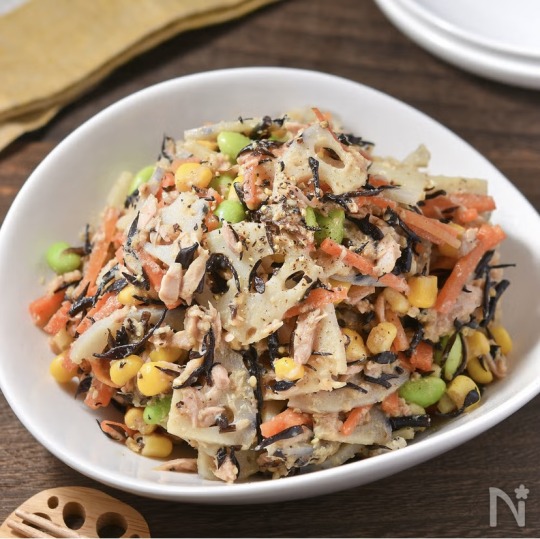
✿ マヨネーズ不使用♪和風サラダ
#cook:副菜#cook:れんこん#cook:副菜:れんこん#cook:砂糖×醤油×酢×鶏がら×味噌#cook:ごま油×砂糖×醤油×酢×鶏がら×味噌#cook:2025〜#2025〜#cook#cook:ホールコーン#cook:えだまめ#cook:ツナ缶#cook:ツナ缶:2025〜#cook:にんじん×れんこん#cook:えだまめ×にんじん×れんこん#cook:副菜:ツナ缶
0 notes
Text

こふく:通称こふ、こふちゃん、稀にこふたん、こふたろう、こふくさん、別名脅威の黒猫
2022年7月、約2ヶ月半で保護施設から引き取られた。脱肛しており長くないかもと言われていたが、無事改善しすくすく育つ。
Jさんに日々挑みかかる強気な幼少期を送るも実は怖がりで、たまのお客さんはおろかじいちゃんにすら挨拶したことがない内弁慶。
だっこを嫌い、呼べば逃げ、最近は何を考えているか分からない顔で床に落ちており、家主ですら意思疎通は困難。しかし朝家主が目覚めると枕シェアによる寄り添いサービスを行っており、一定の愛情はあるもよう。
米をこよなく愛し、炊きたてご飯や準備中の餅米をむしゃむしゃと食べる。また物理的に我が道を行くため多くの物を壊し、実はかなり家主に散財させている。
Kofuku: known as Kofu, Kofu-chan, rarely Kofutan, Kofutaro,or Kofuku-san, and the alias is the black menace
He was adopted from the animal shelter when he was around 2months and a half. Although it was said he might not live so long because he had the anal prolapse, now he has no problems and has gotten so big.
He had a violent childhood attacking Mr.J every day, but his nature is only a home tiger so he can't greet with not only her guests but grandpa yet.
He hates being hugged, runs away when she calls him, and falls on the floor with the face that doesn't know what he's thinking these days, so it's still impossible for landlady to communicate with him. She can feel his affection only by his staying beside service with sharing her pillow when she wakes up.
He loves rice SO much and eats cooked rice or prepared mochi rice. And he always goes his way physically,then broke a lot of things at home so he let her spend quite an extra money...
5K notes
·
View notes
Text
Compliments in Japanese
How do you give compliments in Japanese? Japanese tends to be a very 曖昧 (あいまい) or vague language, so direct compliments tend to be less common.
お世辞 おせじ compliment
誉め言葉 ほめことば compliment, praise
Here are some compliments that can be used in most situations.

Appearance・見た目
Polite 髪の毛切りましたか?似合いますね。 かみのけきりましたか?にあいますね。 Did you cut your hair? It looks good on you.
Casual 髪の毛切った?似合うよ。 かみのけきった?にあうよ。 Did you cut your hair? It looks good.
Polite そのシャツ/ワンピース/服いいですね。 そのシャツ/ワンピース/ふくいいですね。 That shirt/dress/outfit looks good.
Casual そのシャツ/ワンピース/服いいね。 そのシャツ/ワンピース/ふくいいね。 That shirt/dress/outfit looks good.
Polite いい笑顔ですね。 いいえがおですね。 You have a nice smile.
Casual いい笑顔だね。 いいえがおだね。 You have a nice smile.
Work・仕事
Polite 良くやりましたね! よくやりましたね! Good job! / Well done!
Casual 良くやったね! よくやったね! Good job! / Well done!
Polite お見事です! おみごとです! Great work! / Excellent!
Casual お見事! おみごと! Great work! / Excellent!
Polite 今日のプレゼン/スピーチ/アイディアとても良かったです。 きょうのプレゼン/スピーチ/アイディアとてもよかったです。 Today's presentation/speech/idea was very good.
Casual 今日のプレゼン/スピーチ/アイディアとても良かったよ。 きょうのプレゼン/スピーチ/アイディアとてもよかったよ。 Today's presentation/speech/idea was very good.
Skill・腕前
Polite 料理上手ですね。 りょうりじょうずですね。 You are good at cooking.
Casual 料理上手いね。 りょうりうまいね。 You are a good cook.
Polite 写真を撮るセンスがいいですね。 しゃしんをとるセンスがいいですね。 You have good photography sense.
Casual 写真を撮るセンスがいいね。 しゃしんをとるセンスがいいね。 You have good photography sense.
Polite 英語がペラペラですね。 えいごがペラペラですね。 Your English is very fluent.
Casual 英語がペラペラだね。 えいごがペラペラだね。 Your English is very fluent.
#日本語#japanese#japanese langblr#japanese studyblr#langblr#studyblr#compliments in japanese#japanese language#tokidokitokyo#tdtstudy
315 notes
·
View notes
Text
YouTube Channels for Kids by JLPT Levels
(。•̀ᴗ-)✧ resources
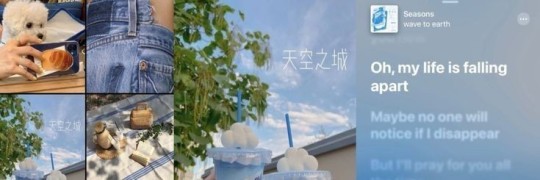
こんにちは, Japanese learners! Learning a language is an exciting adventure, isn't it? To add a spark of joy to your Japanese learning journey, here's a collection of YouTube channels tailored for kids. Organized by JLPT levels, these channels offer a blend of education and entertainment for learners at different stages. Keep in mind, though, that JLPT levels aren't an exact science like math – language learning can be subjective in terms of difficulty. However, these resources provide a fantastic starting point and a fun way to explore the world of Japanese language and culture. Let's hop into this delightful world of animated learning and playful discoveries!
Friendly reminder to adjust your way of learning in order to make the most of what you're studying to reach the goal you truly want! read my post about it (ᵔ◡ᵔ)
꒰ა ˚₊ ✧・┈・╴N 5 ╴・┈・𐑺 ‧₊˚໒꒱
— Curious George (N5 level)
— Japanese folk tales/anime series (Japanese audio/Japanese subtitles) from BomBom Academy (N5 level)
— Peppa Pig (N5-4 level)
— Anpanman (N5-4 level)
— NHK education (N5-4 level)
꒰ა ˚₊ ✧・┈・╴N4 ╴・┈・𐑺 ‧₊˚໒꒱
— Cinnamon Roll, Sanrio (N4 level)
— [Anime] Atashin'chi (N4-3 level)
꒰ა ˚₊ ✧・┈・╴N3 ╴・┈・𐑺 ‧₊˚໒꒱
— Sesame Street Japan (N3 level)
— Chibi Maruko Chan (N3-2 level)
꒰ა ˚₊ ✧・┈・╴N2 ╴・┈・𐑺 ‧₊˚໒꒱
— Precure (N2 level)
またね~@inkichan
꒰ა ˚₊ ✧・┈・╴﹕꒰ ᐢ。- ༝ -。ᐢ ꒱﹕╴・┈・𐑺 ‧₊˚໒꒱
#japanese#nihongo#studyblr#learn Japanese#learning Japanese#japanese langblr#langblog#japanese studyblr#日本語#study japanese#japanese resources#free resources#resources#japanese free resources#youtube#JLPT#JLPT N5
857 notes
·
View notes
Text
Japanese "Onomatopoeia" 『オノマトペ/Onomatope)』
There are two types in Japanese Onomatopoeia. One is 「擬音語(ぎおんご/Gi-on-go)」 which is “written sound” as we hear, and the other is 「擬態語(ぎたいご/Gi-tai-go)」 which is “written sound of status” as we look or feel.
1) 「擬音語(ぎおんご/Gi-on-go)」: “sound” onomatopoeias
As examples, let’s compare onomatopoeias for some animal sounds in Japanese and English.
犬(いぬ/Inu)「ワンワン(Wan-wan)」 Dog: “Woof woof” “Bow-wow”
猫(ねこ/Neko)「ニャー(Nyaa)」 Cat: “Meow”
牛(うし/Ushi)「モー(Moo)」 Cow: “Moo”
豚(ぶた/Buta)「ブーブー(Buu-buu)」 Pig: “Oink oink”
にわとり(Niwatori)「コケコッコー(Kokekokkoo)」Rooster: “Cock-a-doodle-doo”
2) 「擬態語(ぎたいご/Gi-tai-go)」 “status” onomatopoeias
This type is onomatopoeias of “status”. An easy-to-understand example is “わくわく(Waku-waku)” which became famous through “SPY x FAMILY.” “Waku-waku” means being excited or thrilled about something you look forward to. Although the status does not have that sound, we can imagine Anya’s facial expression and emotions just by seeing the word.
By using onomatopoeias, we can describe the situation or the person’s feelings in detail with simple and short words. For example, if you want to say “It’s raining,” here are some onomatopoeias, from the lightest to the heaviest;
①「雨(あめ/Ame)がポツリポツリ(Potsuri-potsuri)と降(ふ/Fu)っている」…Raindrops are falling at intervals.
②「雨がポツポツ(Potsu-potsu)降っている」…Just a few raindrops are falling.
③「雨がパラパラ(Para-para)降っている」…Raindrops are falling continuously
④「雨がしとしと(Shito-shito)降っている」…It’s quiet, but certainly raining continuously.
⑤「雨がザーザー(Zaa-zaa)降っている」…It’s raining hard and making a fair amount of noise.
⑥「雨がドシャドシャ(Dosha-dosha)降っている」…It’s raining dangerously hard.
Onomatopoeias have existed since before manga and anime existed, but manga has made us more familiar with them, and they have enabled us to share delicate expressions with visual images using just a few words. So I think you’ll be familiar with them naturally while watching anime or manga, without extra effort to memorize them.
Hereunder I’ll pick up some lines with onomatopoeias from Season 1 episodes;
―――――――――――――――――――――――――――
From Episode 1 : Maomao
猫猫「たかがウワサ話に何を真剣になってるんだ。こんなのは、ただの憶測にすぎない。すぎないが…ちいとばかし、行ってみるか。そそそそそ…」
Maomao “Takaga uwasa-banashini nanio shinkenni natterunda. Konnanowa tadano okusokuni suginai. Suginaiga…chiito-bakashi itte-miruka. Sososososo…”
Maomao “Why am I taking a rumor so seriously? It’s all just conjecture. But still… I guess I can take a quick peek.”
Episode 13 : Serving in the Outer Court
壬氏「勉強の方はやっているのか?」
Jinshi “Benkyono-howa yatte iru-noka?”
Jinshi “Are you studying?”
猫猫「そそそそそ…」
Maomao “Sososososo…”
Maomao “Sneak, sneak.”
壬氏「おい!」
Jinshi “Oi!”
Jinshi “Hey!”
猫猫「そそそそそ…」
Maomao “Sososososo…”
Maomao “Sneak, sneak!”
「そそそそそ…」: sneak, sneak. (This onomatopoeia might be newly created in this anime.)
―――――――――――――――――――――――――――――――
From Episode 4 : The Threat
猫猫「ぴょーん、ぴょん。仕方ない。もう一度、作り直すか」
Maomao “Pyōn, pyon. Shikata nai. Mo ichido, tsukuri-naosuka.”
Maomao “Boing boing. Oh, well. Guess I have to cook it again.”
「ぴょん(Pyon)」: Jumping, 「ぴょーん(Pyoon)」: Jumping (higher or longer)
―――――――――――――――――――――――――――
From Episode 5 : Covert Operations
やぶ医者「お待たせしました、壬氏さ…しゅん」
Yabu Isha “Omatase shimashita, Jinshi-sa……Shun.”
Quack Doctor “Thank you for waiting, Master Jinshi- Oh.”
「しゅん(Shun)」: Get disappointed and depressed a little
―――――――――――――――――――――――――――
Episode 6 : The Garden Party
貴園「実際、若いの。だって、主上様を産んだのが…こしょこしょこしょ」
Guien “Jissai, wakaino. Datte, shujo-samao unda-noga… Kosho-kosho-kosho.”
Guiyuan “She is young. She gave birth to the emperor when she was…”!”
「こしょこしょ(Kosho-kosho)(with more comical nuance)」「こそこそ(Koso-koso)」: Talking in secret
―――――――――――――――――――――――――――
From Episode 6 : The Garden Party
桜花「ムカ~ッ!」
Infa “Mukaaa!”
Yinghua “Grr!”
桜花「キ~ッ!猫猫に謝りなさいよ!!」
Infa “Kiii! Maomaoni ayamari-nasaiyo!!”
Yinghua “Apologize to Maomao!”
「ムカッ(Muka)」 「ムカーッ(Mukaa)」「キーッ(Kiii)」: Getting angry
―――――――――――――――――――――――――――
From Episode 6 : The Garden Party
猫猫(へえ…こうして見ると、なかなか…。思ったより、お偉いさんなのか。やはり、武官に交ざっても違和感がない。
へえ、さっきの武官も、末席だが、年齢を考えると出世頭か?あのキラキラした宦官はいないけど、まあ、どうでもいい。おっ、それより毒見だ)
Maomao (Hee… Koshite miruto, naka-naka… Omotta-yori, oerai-san nanoka. Yahari, bukanni mazattemo iwakanga nai. Hee, sakkino bukanmo, masseki-daga, nenreio kangaeruto shusse-gashiraka? Ano kira-kira shita kanganwa inai-kedo, maa do demo ii. O, soreyori, dokumi-da.)
Maomao (He looks pretty good there. I guess he’s higher up than I thought. He doesn’t seem out of place among the military officers. Oh look, that officer from earlier. He’s at the very edge, but given his age, I guess that’s still impressive? Our glittering eunuch isn’t there, but who cares? More importantly, food tasting.)
猫猫(…新しいかんざし。宦官もかんざしをもらうのか。そういえば、襟も少し乱れてる。いつものキラキラさもない。うっ、宴席で姿を見ないと思ったら、そういうことか。でも、今なら年相応の青年に…というか、だいぶ幼く見える。こちらのほうが、まだいいな)
Maomao (…Atarashii kanzashi. Kanganmo kanzashio morau-noka. So-ieba, erimo sukoshi midareteru. Itsumono kira-kirasamo nai. U, ensekide sugatao minaito omottara, so-iu Kotoka. Demo, imanara toshi-so’o-no seinenni… to iuka daibu osanaku mieru. Kochirano-hoga mada iina.)
Maomao (A new hairpin? So the eunuchs gets hairpins, too? His collar is a little disheveled, too. Plus his normal glitter is gone. Is that why he wasn’t at the party? But right now, he’s acting his age more than usual… Or rather, he looks quite a bit younger. I prefer him like this, somewhat.”
猫猫(しおらしい。無茶なことを言っているのは承知の上か。いつも通り、無駄にキラキラしてればいいのに。ここ最近の壬氏様は、以前よりもずっと子供のように見えて仕方ない)
Maomao (Shiorashii. Muchana koto’o itte-irunowa shochino ueka. Itsumo-doori, mudani kira-kira shitereba iinoni. Koko saikinno Jinshi-samawa, izen-yorimo zutto kodomono-yoni miete shikata-nai.)
Maomao (How modest. He realizes he’s asking for the impossible. He should just be excessively shiny like his usual self. For a while now, Master Jinshi has seemed much more childish than before.)
―――――――――――――――――――――――――――――――
From Episode 7 : Homecoming
猫猫「チョキチョキチョキ…カチャカチャカチャ」
Maomao “Choki choki choki… Kacha kacha kacha.”
Maomao “Clip clip clip. Clunk clunk clunk.”
―――――――――――――――――――――――――――――――
From Episode 7 : Homecoming
猫猫「シャーッ!」
Maomao “Shaaaaa!”
Episode 14 : The New Pure Consort
猫猫(ハッ!大事な教材を見せるわけにはいかない!)「シャーッ!」
Maomao (Ha! Daijina kyozai’o miseru-wake-niwa ikanai!) “Shaaaaa!”
Maomao (I can’t let him see my precious teaching material.���
シャー!(Shaaa!) : Hissing sound of cats or snakes. It can also show water flowing or something else, depending on the situation.
―――――――――――――――――――――――――――――――
Episode 12 : The Eunuch and the Courtesan
壬氏「どよどよ…いじいじ…じめじめ…」
Jinshi “Doyo-doyo… Iji-iji… Jime-jime…”
Jinshi “Wah, wah, boo-hoo, sob, sob…”
「どよどよ…」: Negative aura stagnates around there.
「いじいじ…」: sulking
「じめじめ…」: humid, muggy, gloomy mood
These words express how depressed Jinshi is, and he isn’t actually crying. I guess they’re translated into “Wah, wah, boo-hoo, sob, sob…” since there was no suitable short word.
―――――――――――――――――――――――――――――――
From Episode 13 : Serving in the Outer Court
白鈴「フフッ、つやつやのぷるぷるに仕上げておいたから」
Pairin “Fufu. Tsuya-tsuyano puru-puruni shiagete oita-kara.”
Pairin “We got her all dolled up for you.”
「つやつや」: glossy, shiny, dewy
「ぷるぷる」: jiggly, texture like a jelly
―――――――――――――――――――――――――――――――
From Episode 13 : Serving in the Outer Court
猫猫(この間やけど薬の実験したから、ぐちょぐちょなんだよな~。しみる~!)
Maomao (Kono aida yakedo-gusurino jikken shita-kara, gucho-gucho nan-dayonaaa. Shimiruuu!)
Maomao (I just tried out some burn medicine the other day, so it’s really messed up right now. Stings!)
「ぐちょぐちょ」: wet and dirty, soaked and dirty
―――――――――――――――――――――――――――――――
From Episode 15 : Raw Fish
猫猫(フグの毒…!あのピリピリした痺れがいいんだ…ああ、食べたい)
Maomao (Fuguno doku…! Ano piri-piri shita shibirega iinda… Aa, tabetai.)
Maomao (Pufferfish poison… I love how it tingles and stings. Oh, I really want some now!)
―――――――――――――――――――――――――――――――
From Episode 18 : Lakan
猫猫(何の薬だろう…?)「フン…ぺろり」(…芋の粉か?壬氏様の薬だよな?)
Maomao (Nanno kusuri daro…?) “Fun…Perori.” (…Imono konaka? Jinshi-samano kusuri dayona?)
Maomao (I wonder what kind of medicine this is.) “Lick.” (Potato flour? This is for Master Jinshi, right?”
―――――――――――――――――――――――――――――――
From Episode 21 : How to Buy Out a Contract
猫猫(こういうのはベラベラ話さないんだな)
Maomao (Ko-iunowa bera-bera hanasa-nain-dana.)
Maomao (So, he doesn’t blab about that.)
―――――――――――――――――――――――――――――――
From Episode 21 : How to Buy Out a Contract
やぶ医者「んん…似てなくもないねえ。唾液を混ぜたら、糊もドロドロじゃなくなるのかねえ」
Yabu Isha “Nn…Nite-nakumo-nai-nee. Daeki’o maze-tara, norimo doro-doroja nakunaru-noka-nee.”
Quack Doctor “Hmm, I suppose so. Maybe mixing saliva into glue would make it less sticky as well.”
「ドロドロ」: muddy, thick, with a nuance of “dirty”
―――――――――――――――――――――――――――――――
Episode 22 : Blue Roses
小蘭「大丈夫だよ~。ぽい!」
Shaoran “Daijobu dayooo. Poi!”
Xiaolan “It’s fine.”
「ぽい!」: light tossing or throwing small thing away
#apothecary english#apothecary romaji#the apothecary diaries#apothecary diaries#learning japanese#japanese#薬屋のひとりごと#薬屋のひとりごと 英語#薬屋 英語 学習#japan#KNH
68 notes
·
View notes
Text
Learn Japanese with Easy Story!
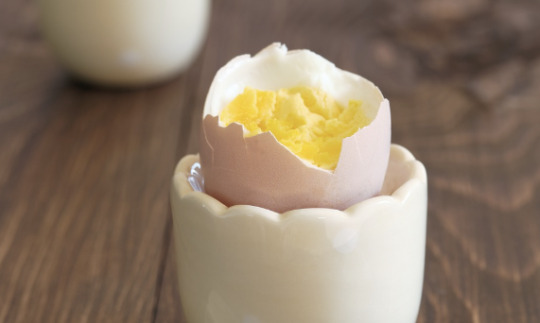
ゆで卵の作り方を学ぼう! Yude tamago no tsukurikata o manabou! Let's learn how to make a boiled egg!
とても簡単だよ。 Totemo kantan da yo. It's very easy to do.
まず、卵を一つ選んでね。 Mazu, tamago o hitotsu erande ne. First, pick an egg.
卵が割れていないか確かめてね。 Tamago ga wareteinai ka tashikamete ne. Make sure the egg is not broken.
次に、卵をお湯の中に入れてね。 Tsugi ni, tamago o oyu no naka ni irete ne. Next, put the egg in a pot of boiling water.
約10分間、ゆでてね。 Yaku 10-punkan, yudete ne. Let it cook for about 10 minutes.
そのあと、卵を気を��けて取り出してね。 Sono ato, tamago o ki o tsukete toridashite ne. After that, take the egg out carefully.
殻をむいたら、ゆで卵ができあがり! Kara o muitara, yude tamago ga dekiagari! Peel off the shell, and your boiled egg is ready! Learn with CrunchyNihongo.com -> https://bit.ly/2Zk4l4K
まなぼう (manabou) – let's learn えらんで (erande) – choose (te-form of えらぶ) われていないか (wareteinai ka) – is not broken (negative form of われる / wareru) たしかめて (tashikamete) – check (te-form of たしかめる / tashikameru) いれて (irete) – put (te-form of いれる / ireru) ゆでて (yudete) – boil (te-form of ゆでる / yuderu) きおつけて (ki o tsukete) – carefully (te-form of きをつける / ki o tsukeru) とりだして (toridashite) – take out (te-form of とりだす / toridasu) むいたら (muitara) – after peeling (tara-form of むく / muku) Learn with CrunchyNihongo.com -> https://bit.ly/2Zk4l4K
ゆで たまご (yude tamago) – boiled egg つくりかた (tsukurikata) – how to make / method かんたん (kantan) – easy たまご (tamago) – egg ひとつ (hitotsu) – one (used for counting things) おゆ (oyu) – hot water なか (naka) – inside やく (yaku) – about (used when talking about time) ぷんかん (punkan) – minutes から (kara) – shell できあがり (dekiagari) – finished, ready (from できあがる / dekiagaru)
Learn with CrunchyNihongo.com -> https://bit.ly/2Zk4l4K
#nihongo#jlpt#japan#nippon#japanese#kanji#hiragana#katakana#hiragana reading practice#hiragana practice
59 notes
·
View notes
Note
Hi YuuRei! I just have a question because I do have a hard time finding it due to not being able to read Japanese but I remember on YouTube there was a video somewhere with two TWST VAs (one of them i think was Rook?) doing a cooking show where they cooked Jade's chef event tofu hamburger and Silver's meat stew and have Rook's VA taste test it and I was wondering that if it was real or not? Thank you so much!
Hello hello! ^^ Thank you for this question!
It was real! It was an installment of Crewel's VA Ito Kent's "Good Boy!" series for the Disney Games channel!
There do not seem to be videos of the VAs themselves cooking Jade's chef event tofu hamburger with a taste-testing of Silver's stew available anymore, but the cooking of the hamburger and stew are there!
Tofu hamburger here!
youtube
Meat stew here!
youtube
If you are interested more in "VAs cook and then eat" videos, we have Crewel's Ito and Cater's Kobayashi both preparing and tasting Cater's potato galette dish and Idia's stuffed bell peppers!
Potato Galette here!
Stuffed Bell Peppers here!
If you are more interested in just the how-to cooking of those dishes without VA involvement they are available here (potato galette) and here (stuffed bell peppers).
And those are all the cooking episodes available!
If you are super sure that you saw a video once of Rook's VA tasting the dishes--you are right 👀
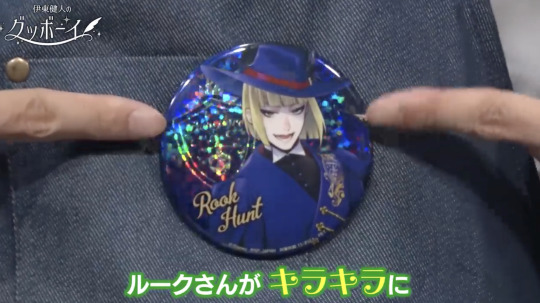
As seen above, two of the videos available are listed as #18 and #19, and yet there are only 12 videos available in the "Ito Kento's 'Good Boy!'" playlist. Rook's VA Itokawa's appearances in episodes #7 (Twst Gourmet: Beef Stew) and #8 (Twst Gourmet: Tofu Hamburger) are no longer viewable!
This is because the official Disney Games YouTube Channel will regularly delete its videos. I am not sure why, but maybe something related to VA appearances? (Most of the VAs come from different agencies, we have no way of knowing the content of one person's contract vs. the content of another's, and I have heard it is all very complicated!)
There used to be a lot more available, such as appearances by Rook's Itokawa, Floyd's Okamoto, Azul's Tamaru, etc. (clips of which can be seen in this compilation video), but videos like Azul's Tamaru hosting an entire episode about keychains, another about Octavinelle rhythmics and a third about Azul's English localization are now gone :<
74 notes
·
View notes
Text
地元の市場に行くと、その土地の食が見えてきます。沖縄の那覇市にある公設市場。魚介類や肉類などが売られています。2階にはそこで購入した魚介類を調理してくれる店舗もあって楽しめます。新鮮な魚、塩焼きや煮付け、刺身で最高!写真は無料でダウンロードできるようにしていますので自由に利用してください。
"When you visit a local market, you get a glimpse of the local cuisine. The Public Market in Naha City, Okinawa, sells seafood, meat, and more. On the second floor, there are shops that will cook the seafood you buy, making for a great experience. Fresh fish, grilled with salt, simmered, or as sashimi—it's the best! The photos are available for free download, so feel free to use them."
27 notes
·
View notes
Text
食材の多い料理店
The Restaurant of Many Ingredients (Much Meat)
全身白髪だらけだと
As he strokes his red crest,
赤いとさかを撫でながら
Fry Kitchen grumbles that he's covered
フライ・キッチンがぼやく
Head to toe in white hairs
石臼での粉挽きなど
This is the first time in his life
生まれて初めて 昔は
That he's ever ground flour with a stone mortar
そんな身分じゃなかった
This hadn't been his standing in life in the past
.
屍用人に身を落としても
Though he'd stooped to the position of undead servant
家畜の姿に変わっても
Though his form had changed to that of livestock
意外と気分は悪くない
It actually isn't all that bad
今になって気がついたのさ
It was now that he realized
机に積まれた札束など
That stacks of money piled up on a desk
何の意味も無かったんだと
Don't really mean anything
.
肉の焦げた匂いが漂う
The smell of charred meat wafts through the air
次は自分じゃない事を祈る
He prays that he isn't next
.
ずっとうんざりしてたのさ
He'd always been so bored and fed up
23人の兄弟ども
So he finally bid farewell
ようやく別れを告げて
To his 23 siblings
ポーク・チョップは独立した
Pork Chop had set out on his own
嬉しい事のはずなのに
This should have been a happy thing
何故だか少し寂しい
But somehow it was a little lonesome
.
鼻を鳴らして野菜を切る
He cuts vegetables while snuffling and snorting
刃物の扱いは慣れたものさ
He's gotten used to holding a knife
何人も刻んできたから
Since he's chopped up countless people
希代の始末屋だったのに
He'd once been uncommonly stingy
今じゃのろまの従兄弟にさえも
But nowadays he can't even hold a candle
頭があがりゃしないのさ
To those blockhead cousins of his
.
熊の瞳がこっちを見ている
The bear's eyes are looking his way
獲物が自分じゃない事を祈る
He prays that he's not its prey
.
憧れのあの方にならば
Chateau Briand had declared that
食べられても構いませんわ
As long as it was by the one he admired
シャトー・ブリアンは言い切った
He wouldn't mind being eaten
あの日話しかけられなくて
He hadn't been able to speak to them that day
助ける事が出来なかった
And so couldn't save them
後悔は今も残る
His regrets linger even now
.
16人目のコックになる
He'd become the 16th cook
決意して門をたたいたけど
Though he had mustered his will and applied for an apprenticeship
既に屋敷はもぬけの殻
The mansion was already an empty husk
今ではもうあの時とは
And now everything
全てが変わってしまったけど
Is different from the way things were then
変わらないものだってあるの
Yet there are some things that haven't changed
.
けだるげな赤猫をみかける
He spies a listless looking red cat
自分のお腹の肉をなでる
It pats the meat of his belly
.
たどたどしい手つきの料理
I wordlessly gaze upon
行う弟子たちの姿を
The sight of my pupils
俺は無言で眺める
Carrying out their clumsy cooking technique
昔のことなど忘れた
I've forgotten most of my past
それでもこの調理場には
Even so, this kitchen
懐かしい匂いがする
Has a scent that brings back memories
.
誰かと旅をし料理をする
To go traveling with someone, and make food with them,
それがかつて自分が望んだ
Wasn't that the life that I had once
生活だったのだろうか
Wished to have?
店をにぎわす異界の客
These guests from the parallel world bustling through the restaurant,
彼らのために用意された
I reach for the new ingredient
新たな食材を手に取る
That I've prepared for them
.
幸せの花は赤く綺麗で
The flower of happiness is a lovely red
メインディッシュのスパイスに最適
It'll be a perfect spice for the main dish
.
再び弟子たちに目をやる
Again he looks towards his apprentices
選ばなければならない
He'll have to select
メインディッシュの食材を
The main ingredient for the main dish
不足で困る事は無い
He isn't lacking in choice
ここはとても食材の多い
This is Mister Dog's restaurant
ミスター・ドッグの料理店
Of many ingredients
30 notes
·
View notes
Text
Fun fact: The name of every main character in grand maison Tokyo contains the name of a type of food or seasoning.
尾花夏樹 (おばな なつき)
ばなな:banana
早見倫子(はやみ りんこ)
みりん: mirin
平古祥平(ひらこ しょうへい)
こしょう: pepper
芹田公一(せりた こういち)
せり: celery
たこ: octopus
蛯名美優(えびな みゆう)
えび: prawn
松井萌繪(まつい もえ)
いも: potato
峰岸剛志(みねぎし つよし)
ねぎ: scallion
柿谷光(かきたに ひかる)
かき: persimmon/oyster
丹後学(たんご まなぶ)
ご ま: sesame
リンダ・真理子・リシャール (りんだ・まちこ・りしゃーる)
ちこり: chicory
久住琹奈(くずみ かんな)
みかん: orange
江藤不三男(えとう ふみお)
とうふ: tofu
相沢瓶人(あいざわ かめひと)
わかめ: seaweed
京野陸太郎(きょうの りくたろう)
のり: another type of seaweed, dried and edible, often used for wrapping sushi
Some of these are quite obvious like 芹田, 蛯名, and 柿谷 which already have food-related kanjis in them. And some of them are kinda reflective of these characters’ personalities. Banana in natsuki’s name is so cute, yellow one the outside and white on the inside. Mirin, the quintessential Japanese seasoning is symbolic of rinko’s cooking style, incorporating traditional Japanese ingredients into French cuisine. It’s no coincidence that both names of aizawa and kyono, who used to work with obana back in Paris, contain a type of seaweed. The versatility of wakame is representative of aizawa’s talent for paring ingredients. Nori, on the other hand, is very dry like kyono, difficult to eat it alone. Kyono is like nori in that he always needs partners.
#takuya kimura#木村拓哉#La grande maison Tokyo#グランメゾン東京#kyoka suzuki#鈴木京香#it just makes me wondering if the screenwriter came up with the food names first and then characters names or the other way around#editing this post was very exhausting as I had to switch between keyboards and I had around a dozen of keyboards on my phone😵
35 notes
·
View notes
Photo
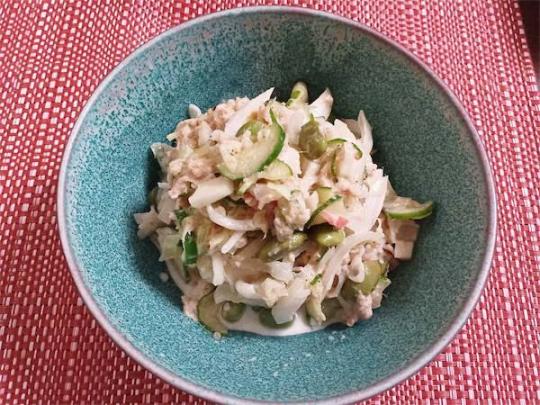
✿ 和風コールスロー ✍️ 白ワイン,たまねぎ,キャベツ,えだまめ→レンジ,ツナ缶なし
#cook:副菜#cook:副菜:キャベツ#cook:副菜:たまねぎ#cook:副菜:えだまめ#cook:副菜:かにかま#cook:かにかま#cook:たまねぎ#cook:キャベツ#cook:えだまめ#cook:2025〜#2025〜#cook#cook:和風コールスロー#cook:ポン酢×マヨネーズ×味噌#cook:すりごま×ポン酢×マヨネーズ×味噌#cook:白すりごま×ポン酢×マヨネーズ×味噌#cook:えだまめ×キャベツ×たまねぎ
0 notes
Text

ヤツは家主にとってもキョウイのクロネコなのよ
ヤツの家主へのアクギョウを
あらためて皆さんにおしえるのよ
He is the menace also for my landlady...so I'm going to tell you about his wrongdoing again.
れいぞこの こおりすとっかーをあけて できたこおりを ぜんぶとかした
↑ゆか水びたし
家主がこおりを作らなくなったら こおりすとっかーに入っていた
↑フタつきカゴをかうことになった
たおるカゴに入り くろい毛だらけにした(シャシンさんしょう)
タナにのぼってフキンカゴをおとす
↑ぜんぶせんたくすることになった
↑フタつきカゴをかうことになった
ゴハンじゃぁ たいまーじかんまえにフタをあけて ゴハンをダイナシにした
ゴハンじゃぁ かってにあけてくう
↑ヨコぼたんのじゃぁをかうことになった
おべんとバコのゴハンをくう
おもちつきのおコメをかってにくう
パスタのふくろを あけてかじる
らぁめんのふくろを あけてかじる
ぷりんくってる家主をおそう
He opened the ice stocker of her refrigerator and let all ice cubes melted
↑it inundated the floor
He entered that stock space after she quit to make ices
He entered her towel box(example photo) and put black furs all the towels
↑ she needed to buy a new box with a lid
He threw away her kitchen cloth box when he climbed and entered the shelf
↑she needed to wash them again
↑ she needed to buy a new box with a lid
He opened the rice cooker before it started to cook so she couldn't have rice at the morning
He opened the rice cooker and ate rice
She needed to buy a new cooker with the side button
He ate rice in her lunch box
He ate mochi rice before she cook
He opened the package of pasta and ate them
He opened the package of lamen and ate them
He raids her every time while she's eating her favorite pudding
6K notes
·
View notes
Text
Translating the Human Side introductions for Witch's Heart, because I've always wanted to know what they said. If someone else has translated these without DeepL, please let me know.
[ translated with DeepL. ] [ localized by me. ] [ DeepLで翻訳 ] [ ローカライズ ]
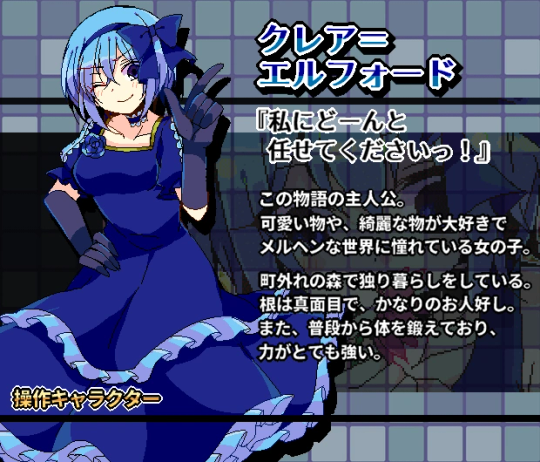
Claire Elford
"I'll take care of it!"
The main character of this story.
She loves pretty and beautiful things,
and longs to live in a fairy tale world.
She lives alone in the forest on the outskirts of town.
She is earnest at heart and quite good-natured.
She also works out on a regular basis and is extremely strong.
and I'll include the Japanese text as well, because there's no reason not to. The golden text [ 操作キャラクター ] is just [ character ].
クレア
エルフォード
『私にどーんと
任せてくださいっ!』
この物語の主人公。
可愛い物や、綺麗な物が大好きで
メルヘンな世界に憧れている女の子。
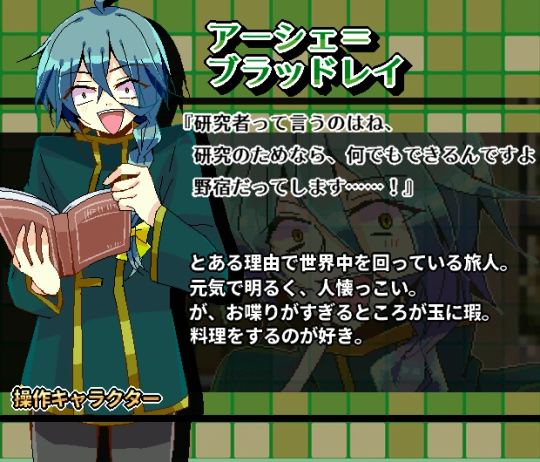
町外れの森で独り暮らしをしている。
根は真面目で、かなりのお人好し。
■また、普段から体を鍛えており、
力がとても強い。
Ashe Bradley
"You know what they say about researchers.
I can do anything for the sake of research.
I can even camp in the wild…………….!"
A man who travels around the world for one reason or another.
He is energetic, cheerful, and friendly.
However, he is a bit too talkative.
He likes to cook.
アーシェ
ブラッドレイ
『研究者って言うのはね、
研究のためなら、何でもできるんですよ
野宿だってします……………!』
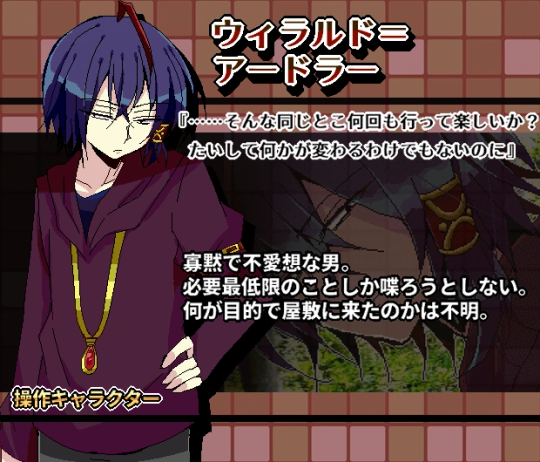
とある理由で世界中を回っている旅人。
元気で明るく、人懐っこい。
が、お喋りがすぎるところが玉に瑕。
料理をするのが好き。
Wilardo Adler
"How much fun is it to go to the same place over and over again?
It doesn't change."
A taciturn, unsociable man.
He only speaks the bare minimum.
It is unclear why he came to the mansion.
ウィラルド
アードラー
そんな同じとこ何回も行って楽しいか?
たいして何かが変わるわけでもないのに』
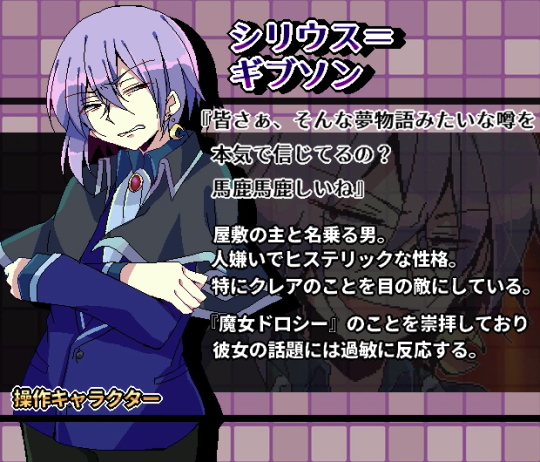
寡黙で不愛想な男。
必要最低限のことしか喋ろうとしない。
何が目的で屋敷に来たのかは不明。
Sirius Gibson
"Do you people really believe those fantastical rumors?
They're absolutely ridiculous."
A man who claims to be the owner of the mansion.
He is misanthropic and hysterical.
He is especially hostile to Claire.
He reveres "The Witch Dorothy",
and is sensitive to any mention of her.
シリウス
ギブソン
『皆さぁ、そんな夢物語みたいな噂を
本気で信じてるの?
馬鹿馬鹿しいね』
屋敷の主と名乗る男。
人嫌いでヒステリックな性格。
特にクレアのことを目の敵にしている。
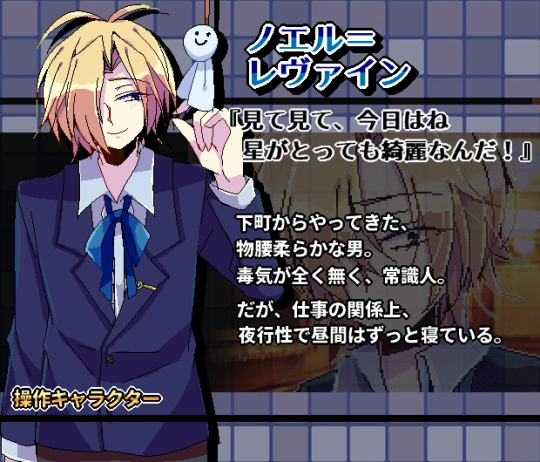
『魔女ドロシー』のことを崇拝しており
彼女の話題には過敏に反応する。
Noel Levine
"Look, look.
The stars are so beautiful tonight!"
A soft-spoken man from downtown.
He is a sensible man with no venom in his voice.
However, due to his work, he is nocturnal and sleeps all day long.
ノエル
レヴァイン
「見て見て、今日はね
星がとっても綺麗なんだ!』
[ Obsessed with Noel being from downtown... And Sirius' hysteria ]
下町からやってきた、
物腰柔らかな男。
毒気が全く無く、常識人。
だが、仕事の関係上、
夜行性で昼間はずっと寝ている。
#witchs heart#witch's heart#claire elford#ashe bradley#wilardo adler#sirius gibson#noel levine#illym translation
34 notes
·
View notes
Text
Memo for Episode 11 (Ep.35) “The Hunt”
馬閃(バセン)「茘(リー)、という国名(こくめい)は、その一文字(ひともじ)で、建国(けんこく)の物語(ものがたり)を表(あらわ)している。草(くさ)の下(した)に三(みっ)つの刀(かたな)…。草は華(はな)、帝(みかど)の先祖(せんぞ)である王母(おうぼ)を指(さ)し、その下の三つの刀は王母を助(たす)けた三人(さんにん)の武人(ぶじん)を示(しめ)す。三つの刀のうち、下二(ふた)つに比(くら)べて大(おお)きい刀は、北(きた)の大地(だいち)・子北州(しほくしゅう)を指(さ)す。子北洲一帯(いったい)は、高粱(コーリャン)や麦(むぎ)を栽培(さいばい)していて、さらに北に行(い)くと、山岳地帯(さんがくちたい)が広(ひろ)がり…て、聞(き)いてるのか!?」
Basen “Rī, to-iu koku-mei’wa, sono hito-moji’de, kenkoku’no monogatari’o arawashite-iru. Kusa’no shita’ni mittsu’no katana… Kusa’wa hana, mikado’no senzo-de-aru Obo’o sashi, sono shita’no mittsu’no katana’wa Obo’o tasuketa san-nin’no bujin’o shimesu. Mittsu’no katana’no-uchi, shita futatsu’ni kurabete ookii katana’wa, kita’no daichi, Shi-Hoku-shu’o sasu. Shi-hoku-shu-ittai’wa, kōryan’ya mugi’o saibai-shite-ite, sarani kita’ni ikuto, sangaku-chitai’ga hirogari…te, kiiteru-noka?!”
Basen “The character used to write the name of our nation, ‘Li,’ also depicts the story of its founding. Three swords under grass. ‘Grass’ is for ‘flower,’ representing the Mother Royal, ancestor of the emperor. The three ‘swords’ under it represent the three warriors who helped her. Of the three swords, the one larger sword represents the Shihoku-shu, the northern lands. That entire area grows sorghum and wheat. If you go further north, you enter a mountainous region… Hey, are you listening?!”
In this line, Basen explained the Kanji “茘(リー)” in detail. For your better understanding, please see below.

――――――――――――――――――――――――――――――
馬閃「何でこんな娘を父上(ちちうえ)は…」
Basen “Nande konna musume’o chichi-ue’wa…”
Basen “Why does my father care so much about this girl?”
The fact that he said this to her shows how young and immature he is, although she is also at fault for dozing off while listening to his explanation.
――――――――――――――――――――――――――――――
猫猫(はて?)「何(なに)か、変(か)わった趣向(しゅこう)でも?」
Maomao (Hate?) “Nanika, kawatta shuko’demo?”
Maomao (Huh?) “Is this some kind of strange rule?”
趣向(しゅこう/Shuko): There seems to be no word which directly refer to it in English… Idea, plan, or taste is used depending on the context.
趣味・趣向(しゅみ・しゅこう) is sometime used in Japanese. 趣味(Shumi) is “hobby”. For example, let’s say I have a hobby of Karaoke and I have a karaoke party with my friends once a month. And I say 「来月は趣向を変えて、コスプレでアニメソングのカラオケパーティをしよう!」. It means “Next month, let’s do something different and have a cosplay karaoke party singing anime songs!” In this case, 趣味(Shumi) is “hobby: karaoke”, and 趣向(Shuko) is “how we enjoy karaoke: cosplay and sing anime songs”. So I guess I can say 趣向(Shuko) is an idea to enjoy something based on your taste.
The word is also used in the following line later;
猫猫(狩りは、宿(やど)から30分(さんじゅっぷん)馬(うま)に揺(ゆ)られ、徒歩(とほ)で一時間(いちじかん)山(やま)を登(のぼ)った高台(たかだい)で行(おこな)われる。お偉方(えらがた)が捕(つか)まえた獲物(えもの)をその場(ば)で調理(ちょうり)するという趣向(しゅこう)のようだ)
Maomao (Kari’wa, yado’kara sanjuppun uma’ni yurare, toho’de ichi-jikan yama’o nobotta taka-dai’de okonawareru. Oera-gata’ga tsukamaeta emono’o sono-ba’de chori-suru-to-iu shuko’no-yoda.)
Maomao (The hunt takes place at a location half an hour away by horse, and then one hour up the mountain by foot. It seems like the point of the event is to cook the game caught by the nobles on the spot.)
――――――――――――――――――――――――――――――
猫猫「そうですか…」(やっぱり壬氏様はいいとこの出(で)なのか…うん、うん)
Maomao “So-desuka…” (Yappari Jinshi-sama’wa ii-toko’no de nanoka… Un, un.)
Maomao “I see.” (So Master Jinshi is from a good family, after all.)
いいとこ(ii toko): good family, good place = いい所(ところ/tokoro)
The word is also used in the following line later;
李白「こんにちは?あ~!嬢(じょう)ちゃんか!どうしたんだ?こんなとこで」
Rihaku “Kon’nichiwa? Aaa! Jochan-ka! Do-shitanda? Konna toko’de.”
Lihaku “Hello? Hey! Little miss! What are you doing all the way out here?”
――――――――――――――――――――――――――――――
高順「小猫は例(れい)のことを何一(なにひと)つ知(し)らない」
Gaoshun “Shaomao’wa rei’no koto’o nani-hitotsu shira-nai.”
Gaoshun “Xiaomao knows nothing about it.”
例の(れいの/Rei’no): the, that, it
This word is used in situations where the speaker and listener know what it refers to, or when they feel embarrassed to say it directly. It enables you to speak without a third party being able to understand.
The word is also used again in the following line later;
男1「これが例(れい)の…随分(ずいぶん)小型(こがた)だな」
Otoko-Ichi “Korega rei’no… zuibun kogata dana.”
Man-1 “Is this it? It’s quite small.”
――――――――――――――――――――――――――――――
猫猫「はぁ。もともと壬氏様のお食事(しょくじ)です」
Maomao “Haa. Moto-moto Jinshi-sama’no oshokuji desu.”
Maomao “Well, it’s your food, after all.”
はぁ(Haa): casual and broken way of saying “はい: Yes”. It shows that Maomao is questioning why he asks such a question. Otherwise “はぁ” may be considered a rude response.
もともと(Moto-moto): originally
壬氏「本当にいいのか?!」
Jinshi “Honto’ni ii-noka?!”
Jinshi “Are you absolutely sure?”
Maomao has no idea why he’s asking so emotionally, but you all do, maybe. His condition is already not good at this point, and he seems to be unable to control his emotions.
――――――――――――――――――――――――――――――
壬氏「ああ。むしろ食え」
Jinshi “Aa. Mushiro kue.”
Jinshi “Yeah. In fact, I order you to.”
むしろ(Mushiro): rather
むしろ+命令形(めいれいけい/Meirei-kei: instruction form): Or rather, do it.
――――――――――――――――――――――――――――――
猫猫「なぜと言われましても…そういう体質(たいしつ)ですから」
Maomao “Naze-to iware-mashitemo… So-iu taishitsu desu-kara.”
Maomao “All I can say is that’s just how I’m built.”
体質(たいしつ/Tai-shitsu): constitution, physical makeup
――――――――――――――――――――――――――――――
猫猫(お若(わか)いとは大変(たいへん)である)
Maomao (Owakai-towa taihen’de aru.)
Maomao (It’s not easy being young and vigorous.)
If I translate it directly, it will be “It is tough to be young.” But Maomao’s way of saying is suggestive, such as “お若い” instead of “若い” even though it’s not necessary to add “お”(Keigo, honorific) for Basen in her monologue. And also judging from the context, we can understand that “…and vigorous” is hidden in her line.
――――――――――――――――――――――――――――――
猫猫(湯(ゆ)あみまでできるとは…贅沢(ぜいたく)だなぁ…。明日(あした)は狩りか…。つつがなく終(お)わるといいけど)
Maomao (Yuami-made dekiru-towa…zeitaku-danaa… Ashita’wa kari-ka… Tsutsuga-naku owaru-to ii-kedo.)
Maomao (A bath, too? How extravagant. The hunt starts tomorrow. I hope it goes without incident.)
つつがなく(Tsutsuga-naku): formal word which means safely, well, without any incident/trouble.
――――――――――――――――――――――――――――――
男1「ここで、あの方には死んでもらう」
Otoko-Ichi “Koko’de, ano kata’niwa shinde-morau.”
Man-1 “This will be where they die.”
方(かた/Kata): It’s like a Keigo of “人(ひと/Hito): person”, same as “お方(おかた/Okata)”. With “お” or without, it means honorific feeling to the person. And if it means more than two people, 方 becomes “方々(かたがた/Kata-gata)”, so this 方 only refers to the single person: Jinshi. I wonder why they translated it as “they”, which could lead viewers to mistakenly believe that Maomao was also a target. If I were to translate it, I would use “that gentleman.”
死んでもらう(しんでもらう): It's hard to translate this expression into English. ~してもらう means “have someone do” and maybe “Here, (is the place where) that gentleman shall die (for us).” would be my direct translation. In Japanese, such expressions are often used, especially in movies or games, just before someone is going to kill the other person, as a softer way of saying.
This line can be more polite, if you change もらう to いただく: ここで、あの方には死んでいただく.
――――――――――――――――――――――――――――――
猫猫「ちょっとご指名(しめい)があったもので」
Maomao “Chotto goshimei’ga atta-mono’de.”
Maomao “I was asked to join.”
指名する(しめいする/Shimei-suru): ask for a certain person, appoint, designate
――――――――――――――――――――――――――――――
猫猫(李白様も指名を受(う)けたのはいいが、地方出身(ちほうしゅっしん)の身(み)。他(ほか)の気位(きぐらい)の高い護衛たちに、追(お)い出(だ)された口(くち)だろう。最近(さいきん)どんどん出世(しゅっせ)しているようだが、その分風当たりは強(つよ)くなる)
Maomao (Rihaku-sama’mo shimei’o uketa-nowa iiga, chiho-shusshin’no-mi. Hoka’no kigurai’no takai goei-tachi’ni, oidasareta kuchi daro. Saikin don-don shusse-shite-iru-yodaga, sono-bun kaze-atari’wa tsuyoku-naru.)
Maomao (Master Lihaku got invited to join too, but he’s from the countryside. The other prideful guards must have pushed him out. He seems to be climbing the ranks recently, but that does tend to be met with resistance.)
~口(くち)だ(~kuchi da): be one of those who~
気位の高い(きぐらいのたかい/Kigurai’no takai): have lots of pride, prideful
風当たりが強い(かぜあたりがつよい/Kaze-atari’ga tsuyoi): windy, windswept, receive harsh treatment, greatly criticized
――――――――――――――――――――――――――――――
猫猫(避暑地(ひしょち)とはいえ、今日(きょう)は天気(てんき)も良(よ)く暑苦(あつくる)しい。快適(かいてき)に過(す)ごすのも一苦労(ひとくろう)だな…。…こんな暑苦しいのに、ずっと覆面(ふくめん)をつけて…料理(りょうり)にも手(て)を付(つ)けないつもりか?どんなに怪(あや)しい覆面姿(ふくめんすがた)でも、上座(かみざ)に座(すわ)っていれば、この中で一番(いちばん)の上客(じょうきゃく)ということなのだろう)
上座(かみざ/Kami-za): the top seat of honor, upper seat ⇔ 下座(しもざ/Shimo-za): the bottom seat, lower seat
I don’t know how it is in China, but in Japan, there are usually 上座 and 下座 in each room, and the guests are guided to 上座. Normally, 上座 is located at the farthest from the door/entrance, and 下座 is at the closest. It depends on each room, and even if it’s not the farthest from the entrance, the seat near the 床の間(とこのま/tokonoma) alcove or one with a good view may be the 上座.
――――――――――――――――――――――――――――――
猫猫(あれが楼蘭妃(ロウランひ)の父(ちち)、子昌様。子北洲の長(おさ)で、この狩りの主催者(しゅさいしゃ)だ。…ん?何か言われたのか?…いや、あのやたら外面(そとづら)のいい宦官が、あんなあからさまな態度(たいど)を取(と)るだろうか…。もしかすると、この暑さのせいで…)
Maomao (Are’ga Roran-hi’no chichi, Shisho-sama. Shi-Hoku-shu’no osa’de, kono kari’no shusai-sha-da. …N? Nanika iwareta-noka? …Iya, ano yatara soto-zura’no ii kangan’ga, anna akarasama-na taido’o toru-daroka… Moshika-suruto, kono atsusa’no sei’de…)
Maomao (That’s Master Shishou, Concubine Loulan’s father. He is the leader of the Shihoku-shu region and the organizer of this hunt. Hmm? Did he say something to him? Would that infinitely well-mannered eunuch show such an obvious attitude? Wait, could it be, because of the heat…)
外面のいい(そとづらのいい/Soto-zura’no ii): looks nice outside (but…)
It’s usually used in a negative sense, like “彼は誰にでも外面はいいが、家族には横柄だ(かれは、だれにでもそとづらはいいが、かぞくにはおうへいだ : He looks so nice with everybody outside, but he’s arrogant towards his family.”
あからさまな(Akara-sama-na): obvious, bald, bare, blatant
It’s also usually used in a negative sense, like “彼女はあからさまに私に意地悪だ(かのじょは、あからさまにわたしにいじわるだ/Kanojo’wa akara-sama-ni watashi’ni iji-waru da : She’s obviously mean to me.”
――――――――――――――――――――――――――――――
壬氏「自分でやる!お前のも貸(か)せ。俺の方(ほう)が力(ちから)があるだろう」
Jinshi “Jibun’de yaru! Omae’nomo kase. Ore’no-hoga chikara’ga aru-daro.”
Jinshi “I’ll do it myself. Give me yours, too. I’m stronger than you.”
猫猫「はあ」
Maomao “Haa.”
Maomao “Yes.”
Here is はあ instead of はい again, which shows Maomao is wondering why his mood seems worse. I think they just translated it as “yes”, because replacing by “yeah” or something would sound too rude.
猫猫(良かった…さっきより体調(たいちょう)は良さそうだ。機嫌(きげん)は悪(わる)そうだけど)
Maomao (Yokatta… Sakki-yori taicho’wa yosa-soda. Kigen’wa waru-soda-kedo.)
Maomao (Good, he looks healthier than earlier. His mood seems worse, though.)
It’s interesting that Maomao has no idea about his behavior, in spite that he’s just embarrassed.
――――――――――――――――――――――――――――――
猫猫「粗末(そまつ)な物(もの)で申(もう)し訳(わけ)ありませんが、食(しょく)していただけますか」
Maomao “Somatsu-na mono’de moshi-wake ari-masen-ga, shoku-shite-itadake-masu-ka.”
Maomao “I know it isn’t much, but would you like to eat any of this?”
粗末な物(そまつなもの/Somatsu-na mono): something shabby/poor/simple
That is a standard phrase to humble, which is used when giving a present in Japan, but in this case Maomao is saying that because butterbur is just a vegetable and it’s not something gorgeous.
~していただけますか(~shite-itadake-masuka): Would you mind if~? Could you~, please? Would it be possible to~?
Although they translated it into “would you like~,” I feel something is off a bit. I think “I’m afraid it’s just something simple, but could you please eat this, please?” is better, because she is not asking him if he’ll eat it, and actually, she’s asking him to eat it.
――――――――――――――――――――――――――――――
I’m sure you all thought “Don’t end here!” The incident where he jumped into the waterfall wasn’t in the original web novel, so when I read this in the light novel first, I was so surprised and thought “What? What’s going on?!” I’m really looking forward to the next episode, but I’m also a little worried, because some online and YouTube posts have overemphasized the sexiness of the scene. (Sorry, it might be the opposite of what you expect!) Anyway, let’s enjoy the next episode together!
#apothecary english#apothecary romaji#the apothecary diaries#apothecary diaries#learning japanese#japanese#薬屋のひとりごと#薬屋のひとりごと 英語#薬屋 英語 学習#japan#KNH#season 2
8 notes
·
View notes
Text
chapter 15: Inside Pumpkin Witch
よく来たな。 最近、オマエ来るのが楽しみ。
冗談じゃないよ。ほんとだよ。
Thanks for coming. I’m always looking forward to it.
No joke, it’s for real!
[MEILING:] Thanks for coming. I look forward to your visits lately.
I'm not joking. I'm serious.
-------
メイリン、用事が無いと 街に出ないから知らないけど、
最近、街が騒がしいな。 来るお客の顔も暗い人多い。
I rarely go to town, so I don’t know, but recently
town is crazy. Many cust- omers come with dark face.
[MEILING:] I don't go out in the city unless I have a reason, so I don't know why...
...but there's been a lot of trouble lately. A lot of my customers come in looking depressed.
-------
だけどオマエは、 いつも瞳がキレイ。
オマエを見ていると元気出る。
But always your eyes look beautiful.
I feel good looking at you.
[MEILING:] But your eyes are always beautiful.
Looking at you cheers me up.
------
きっと心に力があるからね。 メイリンそう思う。
昨日、マーマに電話した。 いろいろ話したよ。
You must have power in your heart, I think so.
Yesterday I call Mama. We talk about many things.
[MEILING:] You must have power in your heart. That's what Meiling thinks.
I called Mama yesterday. We talked about many things.
------
この街のことや。店のことや。 何でも話す。
オマエのことも話した。 マジメで頭良い人が居るって。
This town, this shop, talk about everything.
I talk about you. Say there is serious, smart guy here.
[MEILING:] The city, my shop. We talked about everything.
We talked about you. I said there's a smart, honest guy here.
-----
勝手に話して悪かった。 でも許してくれるな。
メイリン、もうすぐ帰るかも しれないから、時間が無いね。
Sorry for talking without permission. You forgive me.
Maybe I go back to China soon, so no time.
[MEILING:] Sorry for talking without you knowing. Forgive me, okay?
Meiling doesn't have much time. I might go back to China soon.
------
中国で少し用事がある。 でもまた来るから心配不要。
さあ、今日もいきなり始める。 頭脳心理娯楽!
I have errand in China. But I come again, no worries.
Today we start again, psychological test game!
[MEILING:] I have some business in China. But no need to worry. I'll come back again.
Okay, here comes today's sudden psychological test game!
------
メイリンの考えていること、 わかるか、わからないか。
始める、いいな!
You understand or no understand my thinking.
We start, OK?
[MEILING:] Do you understand what I'm thinking, or no?
Let's start!
=======
帰るの嬉しい
マーマの料理食べる
店はしばらくお休み
だけど仕方ない
Going home’s great
Eat mother’s food
Shop’s closed
Can’t be helped
Happy to go home
Eat Mama's cooking
Close the shop for a while
But that can't be helped
--------
パーパの手伝い
保安局の仕事
優秀な人を探す
包子たくさん食べる
Helping father
Job at the NSA
Search for an adept
Eat lots of dumplings
Helping Baba
Job at the Security Bureau
Finding talented people
Eating lots of steamed buns
-------
この人 気に入るか?
読心術持つ者
両親気に入るかも
一緒に来るか?
Interested in him?
A mind reader
Parents might like it
Will you come too?
Interested in him?
A mind reader
Parents might like him
Would [he] come too?
=======
さあ、メイリンは中国帰ったら 何すると思うか?
What will I do when go back to China?
[MEILING:] Okay! What is Meiling gonna do when I go back to China?
-------
>パーパと仕事 | Working with Papa
>マーマと買い物 | Shopping with Mama
>友達と旅行 | Go on trip with friends
======
{OPTION 2: Shopping with Mama
それもいいな~。
マーマと久しぶりに西安の街歩く。 それ楽しみ!
That sounds good...
Walk around Xian town with Mama, I look forward to it!
[MEILING:] That's good too...
Walking around Xi'an City with Mama again. I'm looking forward to it!
-------
でもその理由だけで、 メイリン、店を休まないね。
もしそうしたら、マーマは 半分喜ぶけど、半分怒る。
But I don’t take vacation for just that reason only.
If I do, Mama is half happy but half angry too.
[MEILING:] But I'm not closing up shop just for that.
If I did, Mama would be half happy, but half angry too.
------
仕事は大切ね。それを無視する、 よくないこと、わかるな。
だから間違い。残念だったな。
Job is important. It’s no good to ignore job, OK?
So mistake answer. How unfortunate!
[MEILING:] Work is important. You can't ignore that, okay?
So, wrong answer. Too bad.
--------
でもまたガンバル、それでいい。
メイリン、期待してる。
But you try again, OK?
I count on you.
[MEILING:] But you can try again.
I have high hopes for you.
2}
=======
{OPTION 3: Go on trip with friends
あっ、それいいな。
中国を全部まわること、 それ、メイリンの夢の一つ。
Ah, that sounds nice.
My dream is go all around every part of China.
[MEILING:] Ah, that sounds nice.
One of my dreams is to travel all of China.
-------
我の生まれた国なのに、 まだ全然見ていない。
勉強と仕事が忙しいから、 仕方ないね……。
It’s my mother country, but I barely see anything yet.
So busy with study & work, so it can’t be helped.
[MEILING:] It's the country where I was born, but I haven't seen anything.
I've been so busy with work and school...
[NOTE: 我 in the first line can be the Japanese first-person ware, but I think in this case it's supposed to be the Mandarin wo.]
-------
だから今まで行ったところは 北京だけ。あと日本ね。
でもいつか行く。それ絶対。
So far I only see Beijing. And Japan.
But some day I go for sure!
[MEILING:] So far I've only been to Beijing. And Japan.
But I'm going someday for sure!
-------
中国広いから、全部まわるの かなり大変よ~。
でも友達と行くしない。
China is big, so very hard to see everything.
But I must go with friend.
[MEILING:] China is huge, so it's very hard to travel all of it.
But I have to go with a firend.
------
その時は、メイリン、 たぶん好きな人と一緒……。
火車(列車)で、ゆっくりまわる。 いろんな場所で泊まりながら。
Maybe I go with man I love...
Take slow train, stay over- night many places.
[MEILING:] Maybe with the one I love...
I'll travel by slow huoche (train), stopping overnight in all kinds of places.
-------
だからその時の楽しみ。
あ~あ、間違ったな。 メイリンの心を深く読みすぎ。
I look forward to it.
Ah, you make mistake. You read my mind too deep.
[MEILING:] So I'm looking forward to that time.
Aah, wrong! You read too deep in my mind.
------
でも間違ったけど、 楽しかったから、いいと思う。
またガンバレ! 加油よ!
You make mistake, but it was fun so it’s OK.
You try again! Try hard!
[MEILING:] So you were wrong, but it was fun, so that's okay.
Try again! Jiayou!
3}
=========
{OPTION 1: Working with Papa
あいや~、よくわかったな。
オマエ、やっぱり読心術あるな。
Aiyah, so clever!
You can read minds, huh?
[MEILING:] Aiyah, you got it.
You really are a mind reader.
-------
それともメイリンの心だけが、 わかるか?
どっちにしてもビックリした。
Or maybe only my mind, you understand?
Anyway I’m surprised!
[MEILING:] Or maybe you can only understand my mind?
Either way, I'm surprised.
------
オマエの言う通り。 パーパの仕事手伝いに行く。
大事な仕事だから仕方ないな。
Just like you say. I work with Papa.
It’s important job, so it can’t be helped.
[MEILING:] You're right. I'm going to help Baba at his job.
It's an important job, so I have no choice.
------
でも、少しイヤなところある。
これ絶対言うな、いいか。
But there is bad thing.
You don’t tell no one, OK?
[MEILING:] But there is one little downside.
Don't tell anyone about this, okay?
-------
メイリン、偉い人ばかりの所で、 働かなくてはダメ。
パーパは偉いけど、メイリンは 少しも偉くないね。
I have to work at place with many important people.
Papa is very important, but I’m not so much.
[MEILING:] I have to work somewhere with many important people.
Baba is very important, but I'm not so much.
------
だから絶対ワタシ気を使う……。 はぁ~、大変よ。
日本も大変だけど、中国も大変ね。 国が広いし、民族も多い。
So I must be very polite... Ah, it’s so hard...
America is hard, but China too. Many people & places.
[MEILING:] So I'll have to be very careful... *sigh* It's so hard.
It's hard in Japan too, but then China is hard. The country is huge, so there are lots of different ethnic groups.
-------
だから人民のため働く。 これパーパの言葉。建国の精神ね。
わかるか? メイリン大変なんだよ。
So I work for the people. Papa say so, build country!
You understand? I have many troubles!
[MEILING:] So I work for the people. That's what Baba says. That's the spirit of founding a nation.
You understand? Meiling has it hard.
-------
でも、よくメイリンの心 オマエ、わかったな。
メイリン、考えること早い。
But you really understand my heart, yeah?
I think very fast.
[MEILING:] But you really understand my heart.
I think very fast.
-------
だから誰も普通に読心できない。 それスゴイこと。
やっぱり、オマエ、中国に来る。 そのほうが活躍できる。
So nobody can read my mind. But you ��id, so amazing!
You come to China. You make lots of money there.
[MEILING:] So usually, no one can read my mind. It's amazing that you can.
You really should come to China. You'd be very successful there.
-------
10億の人民とワタシのために、 来てくれれば感謝する。
パーパとマーマも、きっと喜ぶ。
You come to China, me and 1 billion people thank you!
Papa & Mama will be happy, too!
[MEILING:] I'd be grateful if you come, for one billion people and me.
Baba and Mama will be happy, too!
-------
オマエ、真剣に考えて欲しい。 大事な話よ、いいな?
ワタシと一緒に、中国を救え。
You think seriously. This is very important, OK?
You save China with me.
[MEILING:] I want you think about it seriously. This is very important, okay?
Come save China with me.
-------
中国人民とワタシが待っている。
キャア! 恥ずかしい! まるでプロポーズね、これ。
ワタシ、恥ずかしいから逃げる。 オマエ考えておく、なっ!
Me & China are waiting.
Uwa, how embarassing! Like I proposing to you!
I’m embarassed so I run away, you consider, OK?
[MEILING:] The citizens of China and I will be waiting.
Kyaa! So embarrassing! It's like I'm proposing!
I'm gonna run away because I'm embarrassed. But you think about it, okay?
3 notes
·
View notes
Text
Ikkiuchi - Lyrics + Translation (一騎打ち)
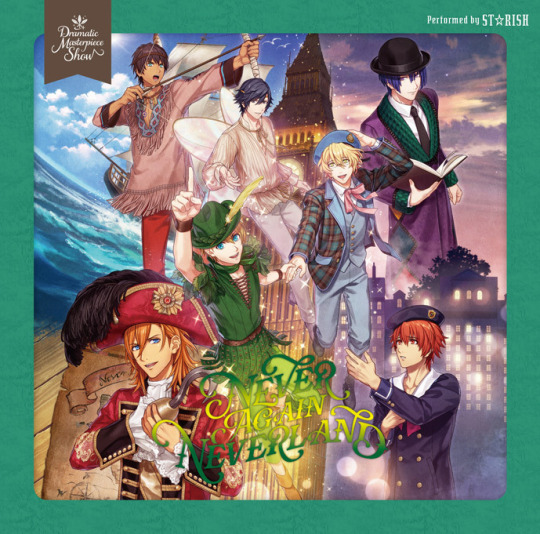
English title: One-on-one combat / Duel
Translator's notes can be found at the end and are marked with an asterisk.
Please do not repost/retranslate without permission.
Kanji:
【Re】 ヨーホー! ヨーホー!
誰もが恐れおののく 俺は海賊
このフックが調理してやろう
コックのように フルコース
味わわせてみせよう 華麗な技を
【Ce】 イーハー! イーハー!
誰よりも誇り高き ボクは戦士
このタイガー・リリーが戦いの喜びを教えてあげる
戦場を制するルーラー(支配者)
戦いのルールはボクさ
【Re】 笑わせるな
お前はルーザー 俺はクローザー
お前の命を終わらせる者
【Ce】 生きるか死ぬか 覚悟はできたか?
命が短いのはどちらの方?
【Re】 生意気な若造 世間を知らない
口先ばかりで 恐怖も知らない
【Ce】 何を生き急ぐ? 驕り高ぶる大人よ
どうせ死にゆく定めなのに
【Re】 死なない人間などいない
時は誰しも平等で残酷なのさ
【Ce】 だからこそ譲れない
この身を賭した一撃は
【Re】 「やるな……」
【Ce】 「そちらこそ!」
【Re】 「さぁ、決着をつけよう!」
【Ce】 「望むところだ!」
【Re】 知らないがゆえに 壇上を舞う強さ
【Ce】 知っているゆえの 盤上の駆け引き
【Re・Ce】 讃えよ
重ね合う剣
【Re】花を散らして
【Ce】花を散らして
【Re・Ce】 海の藻屑となるがいい
Rōmaji:
【Re】 Yōhō! Yōhō!
Daremo ga osore ononoku ore wa kaizoku
Kono fukku ga chōri shite yarou
Kokku no yō ni furukōsu
Ajiwawa sete miseyou karei na waza o
【Ce】 Īhā! Īhā!
Dare yori mo hokori takaki boku wa senshi
Kono Taigā Rirī ga tatakai no yorokobi o oshieteageru
Senjō o seisuru rūrā
Tatakai no rūru wa boku sa
【Re】 Warawaseru na
Omae wa rūzā ore wa kurōzā
Omae no inochi o owaraseru mono
【Ce】 Ikiru ka shinu ka kakugo wa dekita ka?
Inochi ga mijikai no wa dochira no hou?
【Re】 Namaiki na wakazō seken o shiranai
Kuchisaki bakari de kyōfu mo shiranai
【Ce】 Nani o iki isogu? Ogori takaburu otona yo
Dōse shini yuku sadame na noni
【Re】 Shinanai ningen nado inai
Toki wa dare shimo byōdō de zankoku na no sa
【Ce】 Dakara koso yuzurenai
Kono mi o toshita ichigeki wa
【Re】 “Yaru na……”
【Ce】 “Sochira koso!”
【Re】 “Sā, ketchaku o tsukeyou!”
【Ce】 “Nozomu tokoro da!”
【Re】 Shiranai ga yue ni danjō o mau tsuyo-sa
【Ce】 Shitte iru yue no banjō no kakehiki
【Re・Ce】 Tataeyo kasaneau tsurugi
【Re】 Hana o chirashite
【Ce】 Hana o chirashite
【Re・Ce】 Umi no mokuzutonaru ga ī
Translation:
【Re】 Yo-ho! Yo-ho!
I am a pirate that makes everyone shake from fear
With this hook of mine, I’ll cook
A full course like a chef
I’ll give you a taste of my brilliant technique
【Ce】 Yee-ha! Yee-ha!
I am a warrior, prouder than anyone else
This Tiger Lily will teach you the joys of battle
I am the ruler who controls the battlefield,
The one who makes the rules of the battle is me
【Re】 Don’t make me laugh
You’re the loser, I am the closer*
Who will end your life
【Ce】 Are you ready to live or die?
Which of us shall have the shorter life?
【Re】 You’re an impertinent young lad, ignorant of the ways of the world
You’re all talk and no bite, and you don’t know terror
【Ce】 What’s the hurry? You’re an arrogant adult
Even though you’re doomed to die anyway
【Re】 There’s no such thing as a human who will never die
Time is equal and cruel to all
【Ce】 That’s why I won’t give up
The single blow I’m risking my life for
【Re】 “Not bad…”
【Ce】 “I could say the same.”
【Re】 “Now, let’s settle this!”
【Ce】 “That’s what I want!”
【Re】 The strength to dance on the stage because of ignorance
【Ce】 The ability to use tactics on the board because you know them
【Re・Ce】 Praise be
To the overlapping swords
【Re】 Let us fight fiercely
【Ce】 Let us fight fiercely
【Re・Ce】 Until one of us dies at sea
Translator's notes:
(クローザー) Closer- “In baseball, a closing pitcher, more frequently referred to as a closer, is a relief pitcher who specializes in getting the final outs in a close game when his team is leading.” [Wikipedia]
#uta no prince sama#utapri#translation#english#drama cd#otoya ittoki#masato hijirikawa#natsuki shinomiya#tokiya ichinose#ren jinguji#syo kurusu#cecil aijima#dramatic masterpiece show#nan#never again neverland
21 notes
·
View notes